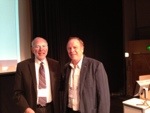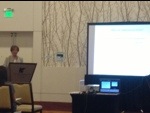ECP is one of the few professional, non marketing international conferences that I attend for psychology and training. I present regularly at international conferences, and find the attendees particularly interested in the application of theory and research to treatment settings. I just finished presenting to interested colleagues on the benefits of treatment in the wilderness camp settings, like you find at Wingate in Utah, and others. They were excited and amazed to find Americans are using the wilderness to compel a counseling milieu for adolescents and young adults.
I also had the opportunity to attend a panel symposium on international law and psychology that highlighted research around international child custody rules and judicial sentiment, if you will in move away scenarios involving custodial parents. Of course, my interest is in finding education and therapeutic schools and programs in “the best interest” of the child. I was happy to hear Dr. Phi Stahl speak on the subject. I also had the opportunity to be photographed with the present APA president Don Berstoff who also participated in the panel. I am thankful to be a member of APA.
Art therapy is gaining new ground to help develop positive self concept and self esteem, and to express emotions and promote regulation of emotions. A recent study conducted in Estonia has found particular usefulness of art therapy when used with incarcerated young adult females. In Estonia, art therapy includes drawing, movement, and music. Strengths and Difficulties Questionnaire was used as pre and post testing, and found to diminish aggressive behavior, while promoting prosocial behavior.
All and all, the globalization of these applied psychology and education methodologies is gaining strength and interest from learning institutions and politicians. Psychology is at the forefront in finding ways to blend international law, culture, and education together for the betterment of people. However, the efforts are not without huge barriers, conflicts, and concerns for privacy, individualization, and strengthening of families and institutions.
All that said if you need an expert to help in the relocating of your family to either international or domestic places by helping to answer questions around education, care, and treatment call us today; 877-571-2524


